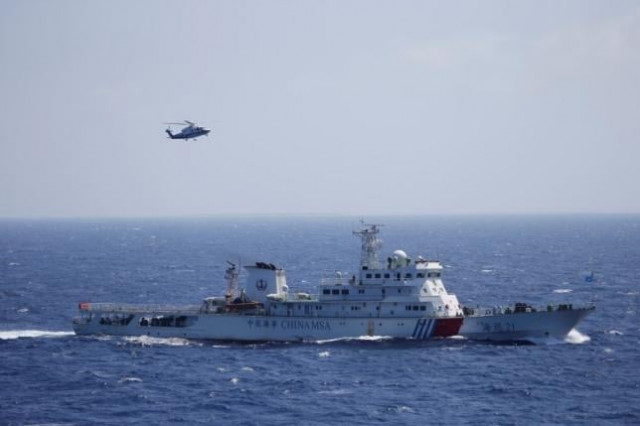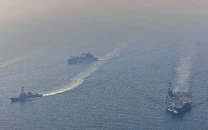China says Laos supports it on South China Sea case
China claims much of the South China Sea, through which more than $5 trillion of trade moves annually

Chinese ship and helicopter are seen during a search and rescue exercise near Qilian Yu subgroup in the Paracel Islands, which is known in China as Xisha Islands, South China Sea, July 14, 2016. PHOTO: REUTERS
The remarks by Solicitor General Jose Calida follow two days of carefully calibrated responses from the Philippines and are almost certain to irritate China further.
Tribunal rules against Beijing in South China Sea dispute
Manila has so far been keen not to rock the boat in the hope of starting dialogue toward Beijing allowing it to exercise what the Permanent Court of Arbitration in The Hague ruled were its sovereign maritime rights.
"It confirms that no one state can claim virtually an entire sea. The award is a historic win not only for the Philippines ... it renews humanity's faith in a rules based global order," Calida told a forum on the South China Sea.
"The award opens a horizon of possibilities for all stakeholders. The award is a crowning glory of international law."
China has refused to recognise Tuesday's ruling and did not take part in its proceedings. It has reacted angrily to calls by Western countries for the decision to be adhered to.
China's Foreign Ministry on Friday said Beijing's position on the case had the support of Laos, the current chair of the Association of South East Asian Nations (ASEAN), a regional bloc long dogged by discord over how to deal with China's maritime assertiveness.
South China Sea: facts on a decades-long dispute
The verdict was discussed on Thursday between Chinese Premier Li Keqiang and Lao Prime Minister Thongloun Sisoulith ahead a regional summit in Mongolia.
"Thongloun said that Laos supports China's position, and is willing to work with China to maintain peace and stability in the South China Sea region," the ministry said in a statement.
The statement did not elaborate. Laos' foreign ministry has not responded to Reuters' request for comment on the ruling and its state media made no mention of Thongloun's comments to Li.
Land-locked Laos, which is boosting economic ties with China, will be hosting a key security meeting later this month at which the South China Sea is expected to dominate. ASEAN has not issued a statement about the ruling and its members have not said why.
CAUTIOUS APPROACH
China has said it has widespread support for its rejection of the case but many countries have stuck to cautious comments about resolving disputes peacefully and following international laws.
China claims much of the South China Sea, through which more than $5 trillion of trade moves annually. Brunei, Malaysia, the Philippines, Taiwan and Vietnam have rival claims.
Philippines' President Rodrigo Duterte ended his unusual silence at a private function late on Thursday and said he wanted dialogue with China and was considering sending former President Fidel Ramos to Beijing to get the ball rolling.
"War is not an option," he said. "So, what is the other side? - Peaceful talk."
Hague tribunal rejects Beijing’s South China Sea claims
Immediately after the ruling, the normally brash and outspoken Duterte privately told his ministers to be magnanimous and not to pique Beijing, according to one minister.
But the cautious tone appears to be changing in the Philippines, where there are signs of public disgruntlement with the subdued government response to a decision that most of the country was celebrating.
The United States, a key Philippines' ally, is urging Asian nations not to move aggressively to capitalize on the court ruling, according to US administration officials.
The chief of its naval operations, Admiral John Richardson will discuss the South China Sea among other issues when he meets China's navy commander, Admiral Wu Shengli, from Sunday on a three-day trip to "improve mutual understanding", according to a US navy statement.



















COMMENTS
Comments are moderated and generally will be posted if they are on-topic and not abusive.
For more information, please see our Comments FAQ